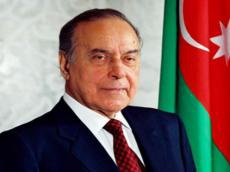|
|
TODAY.AZ / Baku-2015
Azerbaijanis celebrate National Salvation Day
15 June 2015 [09:15] - TODAY.AZ

By Aynur Karimova
Every year on June 15, Azerbaijanis all over the world celebrate National Salvation Day, the beginning of a new stage in the history of independent Azerbaijan.
For Azerbaijanis, this is one of the country’s most memorable days, marking the historical return of the national leader Heydar Aliyev from the Nakhchivan Autonomous Republic to capital Baku in 1993.
The holiday has its roots in the early 1990s, as chaos swept through all spheres of social life, and the armed forces were in a grave situation. The occupation of Azerbaijani territory by Armenians was increasing day by day as the Nagorno Karabakh War escalated from 1991 to 1994.
The threat of civil war loomed as various individuals and groups engaged in a bitter struggle for power.
In such troubled times, the country was in need of a strong-willed leader who could solve the existing crisis and prevent potential crises in the future.. And this person was the prominent political leader Heydar Aliyev.
Desperate and helpless, the people of Azerbaijan invited their national leader from the Nakhchivan Autonomous Republic to Baku on June 15, 1993 and elected him Chairman of the Azerbaijani Supreme Soviet.
After securing order, Heydar Aliyev chose to set Azerbaijan on a democratic path. A new constitution was adopted in 1995. New progressive laws were passed, bringing drastic changes to the judiciary.
Constructive activities in the armed forces, structural changes, unification of combat operations under a single leadership, new military techniques based on established practices had brought new quality to the Azerbaijani army as well.
Building a modern state on a strong and solid foundation and on national values had been one of Heydar Aliyev's main goal.
Azerbaijan's oil strategy, begun under an initiative by Heydar Aliyev, has been one of the key contributors to Azerbaijan's rapid development. The grandiose oil contract, later called the "Contract of Century", was signed with the Western oil companies in Baku on September 20, 1994. Neither coup attempt nor outside and inside pressures could break the will of the Azerbaijani leader. This contract instilled confidence to those who were full of doubt about the future of the new republic.
After the establishment of political stability, the decline in production and the economic downturn were gradually overcome, ushering in a new stage in the economic development for Azerbaijan. The achieved macroeconomic stability, growth in industry and other sectors, and the initial results of economic reforms reflected the steps taken by Azerbaijan to transition into a market economy.
Azerbaijan's foreign policy had also gone through radical changes in this period. Azerbaijan strengthened its place in international relations system by setting its short-term international goals, and signed major strategic contracts with European countries, the United States, newly independent states, Turkic states, Muslim world, Iran, Asia, Africa and South America. One of Heydar Aliyev’s most crucial foreign policy achievements was the accession of Azerbaijan to the Council of Europe in 2001, and its integration into the European family.
Heydar Aliyev’s policies over time proved to be essential in saving the fledgling country from chaos and disentigration.
Drawing upon his initial successes, Heydar Aliyev was elected President of Azerbaijan on October 3,1993 by popular vote.
The newly-elected President was ready to do all within his power in the name of salvation for his Motherland and his nation. He was ready for any sacrifice for his Motherland. Heydar Aliyev's name entered the history of Azerbaijan as the “Great Rescuer.”
The celebration of June 15 as National Salvation Day is a symbol of endless confidence in the Azerbaijani nation in its great son. This holiday gained its official status in 1997 and since 1998 it is celebrated as a national holiday.
Each year such a memorable date is celebrated with much éclat throughout the entire territory of Azerbaijan. The country holds many official and festive events dedicated to this day. In addition, large cities and mountainous regions, far from the capital hold festivals with traditional Azerbaijani dances and games. Baku, the country's capital commemorates the holiday with a colorful fireworks display over the Caspian seashore in the evening.
URL: http://www.today.az/news/baku2015/141423.html
 Print version
Print version
Connect with us. Get latest news and updates.
See Also
- 02 September 2025 [13:49]
Baku to host OIC Cultural Festival and Creative Week - 20 November 2024 [18:31]
Tourism and air transport vital for livelihoods and green jobs: UN Tourism CEO - 24 September 2024 [16:15]
Baku to host World Urban Development Forum - 19 August 2024 [15:08]
Khatai Arts Center announces art competition - 14 May 2024 [11:39]
Azerbaijan & Kyrgyzstan central banks sign memorandum - 08 April 2024 [12:51]
Azerbaijani Chamber of Accounts identifies financial violation last year - 06 April 2024 [10:54]
Azerbaijan, Kyrgyzstan discuss COP29 - 10 June 2021 [18:10]
Southern Gas Corridor may help to resolve some global energy issues - Kurt Donnelly - 27 April 2021 [18:19]
Pakistan to organize Pakistan-Azerbaijan Business Forum - 16 March 2021 [16:23]
Azerbaijan's foreign trade surplus hits $1.1bn in Jan-Feb
Most Popular
 Gulf nations offer support for Yemen’s government and Saudi security
Gulf nations offer support for Yemen’s government and Saudi security
 Porsche recalls cars over camera issue
Porsche recalls cars over camera issue
 Why Fico’s EU critique reflects Slovak politics more than European reality
Why Fico’s EU critique reflects Slovak politics more than European reality
 Georgia eyes Baku–Tbilisi–Kars rail finish in 2026 push
Georgia eyes Baku–Tbilisi–Kars rail finish in 2026 push
 China unveils 2026 subsidy scheme for home appliance trade-ins
China unveils 2026 subsidy scheme for home appliance trade-ins
 Four injured, including three children in Russian attack on Odesa, Ukraine says
Four injured, including three children in Russian attack on Odesa, Ukraine says
 Azercell introduces an enhanced “Wheel of Gifts”
Azercell introduces an enhanced “Wheel of Gifts”
